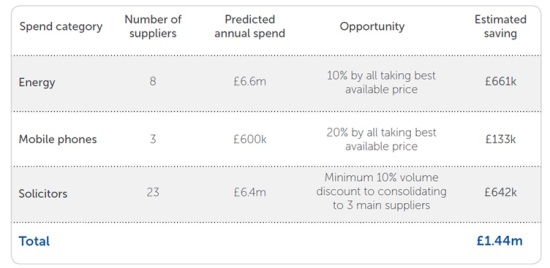Saving money or losing credibility? DCLG does itself no favours
Just when you think government is getting the message about treating statistics sensibly, some department proves you wrong. This time it’s the turn of the Department for Communities and Local Government.
In the middle of June it issued a press release headed “Shining a light on local council spending could save up to £450 per household”. It derived from research by Opera Solutions – which describes itself as the largest independent predictive analytics company in the world - and such were its findings that they got a fair amount of media coverage. The figure alone ought to have made journalists pause, because it’s implausibly large.
Ben Goldacre has already had a go at this report and the way it was sold by DCLG, but it’s so egregious it deserves another run through the mincer. The claim is that local government could save 10-20 per cent of procurement spending – up to £10 billion across local government.
That’s a big claim. Where’s the evidence? In a 7-page report that looked at just three councils, and assessed spending on just three items – energy, mobile phones, and solicitors. The councils are not named.
So Opera estimates what could be saved in just these three budget areas in three councils and claims that the same percentage could be saved in all procurement budgets for all councils nationally. All that, the report claims proudly, “with little impact on local authority service delivery”.
Here’s the report’s solitary table:

Nowhere in the report is there any explanation of how these savings might be made or where the estimated percentages come from. (“Taking best available price” regardless of quality is not necessarily the best practice.)
On these slender foundations DCLG builds the claim that better council spending could save £10 billion a year or £452 per every household (in England, presumably). So £1.44 million of unproved savings become £10 billion. The Daily Mail and the Daily Express picked up on the story.The Mail's headline was: “Council incompetence 'costs every household £452 a year.”
To reach the 20 per cent saving, you have to take the upper estimate of the savings on mobile phone contracts, by far the smallest annual spend of the three areas considered. Overall, Opera’s estimate of savings in the three areas is actually just over 10 per cent.
What’s more, the DCLG had plenty of other research data to go on. For example, a report from Improvement and Efficiency South East, a body which works with local councils to identify ways of saving money. This report breaks down where procurement spending by local authorities really goes, and identifies potential savings of £641 million in 2011-12, £982 m in 2012-13, and £1,318 m in 2013-14. See Table 2, below.

The row entitled "Other commodies and services" includes professional services, IT, energy and utilities and office solutions - the areas covered by Opera – and there are indeed substantial savings to be made. But the actual amounts are unlikely to exceed £220 million a year, the report says.
In the press release launching Opera’s report, Local Government .Secretary Eric Pickles said that it showed significant scope for councils to make taxpayers’ money work even harder and that the availability of financial data had made it possible to identify the ways this might be done. “We’ve always said sunlight is the best disinfectant” he said
Time for a bit of sunlight to be shone on the shameless way DCLG spun this particular fragment of research. It tells us nothing worthwhile; it conveys a totally false impression of what is possible; and it makes one despair of the standards of evidence Mr Pickles deems acceptable.



